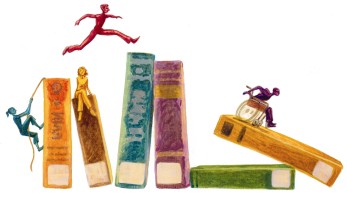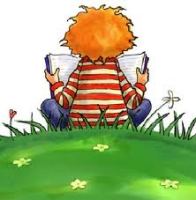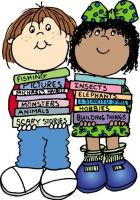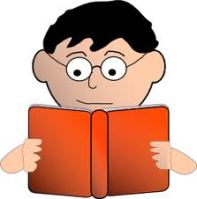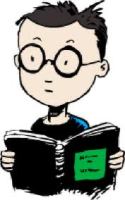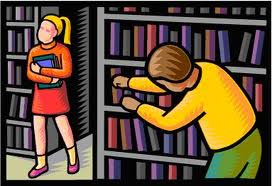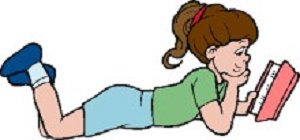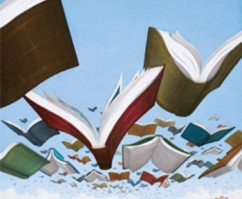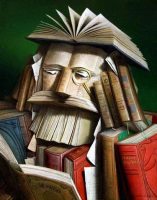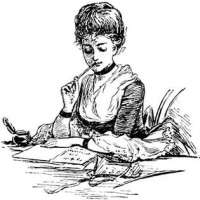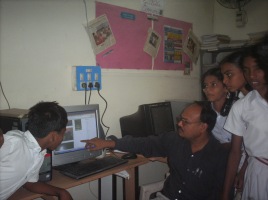Annual Day 2011
Posted in kendriya vidyalaya
Check out my Slide Show!
Posted in kendriya vidyalaya
Check out my Slide Show!
Posted in books, education, fiction, kendriya vidyalaya, library
Dewey Decimal Classification
Dewey Decimal Classification
Collected by – sangam sreenivas, librian kv knl
By using this DDC we can easily locate the books on specific subject without wasting the valuable time.
Dewey Decimal Classification
The Dewey Decimal Classification (DDC) system uses simple decimal notation to divide recorded knowledge into 10 main classes, 100 divisions and 1,000 sections. DDC 22 Summaries provides a complete list of these groupings. Browsing the summaries is fast and easy way to become familiar with the DDC’s structure.
First Summary
The Ten Main Classes
000 Computer science, information & general works
100 Philosophy & psychology
200 Religion
300 Social sciences
400 Language
500 Science
600 Technology
700 Arts & recreation
800 Literature
900 History & geography
Second Summary
The Hundred Divisions
000 Computer science, knowledge & systems
010 Bibliographies
020 Library & information sciences
030 Encyclopedias & books of facts
040 [Unassigned]
050 Magazines, journals & serials
060 Associations, organizations & museums
070 News media, journalism & publishing
080 Quotations
090 Manuscripts & rare books
100 Philosophy
110 Metaphysics
120 Epistemology
130 Parapsychology & occultism
140 Philosophical schools of thought
150 Psychology
160 Logic
170 Ethics
180 Ancient, medieval & eastern philosophy
190 Modern western philosophy
200 Religion
210 Philosophy & theory of religion
220 The Bible
230 Christianity & Christian theology
240 Christian practice & observance
250 Christian pastoral practice & religious orders
260 Christian organization, social work & worship
270 History of Christianity
280 Christian denominations
290 Other religions
300 Social sciences, sociology & anthropology
310 Statistics
320 Political science
330 Economics
340 Law
350 Public administration & military science
360 Social problems & social services
370 Education
380 Commerce, communications & transportation
390 Customs, etiquette & folklore
400 Language
410 Linguistics
420 English & Old English languages
430 German & related languages
440 French & related languages
450 Italian, Romanian & related languages
460 Spanish & Portuguese languages
470 Latin & Italic languages
480 Classical & modern Greek languages
490 Other languages
500 Science
510 Mathematics
520 Astronomy
530 Physics
540 Chemistry
550 Earth sciences & geology
560 Fossils & prehistoric life
570 Life sciences; biology
580 Plants (Botany)
590 Animals (Zoology)
600 Technology
610 Medicine & health
620 Engineering
630 Agriculture
640 Home & family management
650 Management & public relations
660 Chemical engineering
670 Manufacturing
680 Manufacture for specific uses
690 Building & construction
700 Arts
710 Landscaping & area planning
720 Architecture
730 Sculpture, ceramics & metalwork
740 Drawing & decorative arts
750 Painting
760 Graphic arts
770 Photography & computer art
780 Music
790 Sports, games & entertainment
800 Literature, rhetoric & criticism
810 American literature in English
820 English & Old English literatures
830 German & related literatures
840 French & related literatures
850 Italian, Romanian & related literatures
860 Spanish & Portuguese literatures
870 Latin & Italic literatures
880 Classical & modern Greek literatures
890 Other literatures
900 History
910 Geography & travel
920 Biography & genealogy
930 History of ancient world (to ca. 499)
940 History of Europe
950 History of Asia
960 History of Africa
970 History of North America
980 History of South America
990 History of other areas
Posted in Uncategorized | Tags: classification
famous people birthdays – sangam sreenivas
Library KV Kurnool
| January 3, 106 | Cicero |
| January 3, 1892 | J.R.R.Tolkien |
| January 6, 1412 | Joan of Arc |
| January 8, 1935 | Elvis Presley |
| January 8, 1942 | Stephen Hawking |
| January 15, 1926 | Chuck Berry |
| January 15, 1929 | Martin Luther King Jr |
| January 17, 1706. | Benjamin Franklin |
| January 17, 1860. | Anton Checkov |
| January 19, 1809 | Edgar Allan Poe |
| January 19, 1839 | Paul Cezanne |
| January 19, 1943 | Janis Joplin |
| January 20, 1920 | Federico Fellini |
| January 20, 1946 | David Lynch |
| January 22, 1788 | Lord George Gordon Noel Byron |
| January 22, 1844 | August Strindberg |
| January 22, 1935 | Sam Cooke |
| January 25, 1759 | Robert Burns |
| January 25, 1874 | Somerset Maugham |
| January 25, 1882 | Virginia Woolf |
| January 26, 76 | Roman Emperor Hadrian |
| January 27, 1756 | W.A. Mozart |
| January 27, 1832 | Lewis Carroll |
| January 28, 1912 | Jackson Pollock |
| January 29, 1939 | Germain Greer |
| February 2, 1882 | James Joyce |
| February 3, 1874 | Gertrude Stein |
| February 4, 1902 | Charles A. Lindbergh |
| February 5, 1914 | William Burroughs |
| February 6, 1945 | Bob Marley |
| February 7, 1812 | Charles Dickens |
| February 8, 1828 | Jules Verne |
| February 8, 1931 | James Dean |
| February 10, 1898 | Bertolt Brecht |
| February 11, 1847 | Thomas Edison |
| February 12, 1809 | Abraham Lincoln |
| February 15, 1564 | Galileo Galilei |
| February 15, 1954 | Matt Groening |
| February 18, 1932 | Milos Forman |
| February 19, 1473 | Nicolaus Copernicus |
| February 19, 1940 | Smokey Robinson |
| February 20, 1925 | Robert Altman |
| February 21, 1903 | Anais N?n |
| February 21, 1933 | Nina Simone |
| February 22, 1898 | Enzo Ferrari |
| February 22, 1900 | Luis Bunuel |
| February 23, 1685 | Georg Friedrich Handel |
| February 25, 1901 | Zeppo Marx |
| February 25, 1917 | Anthony Burgess |
| February 26, 1908 | Tex Avery |
| February 26, 1932 | Johnny Cash |
| February 27, 1934 | Ralph Nader |
| March 1, 1914 | Ralph Ellison |
| March 2, 1904 | Dr. Seuss |
| March 3, 1847 | Alexander Graham Bell |
| March 4, 1932 | Miriam Makeba |
| March 5, 1871 | Rosa Luxemburg |
| March 6, 1928 | Gabriel Garcia-Marquez |
| March 7, 1875 | Maurice Ravel |
| March 9, 1454 | Amerigo Vespucci |
| March 9, 1943 | Bobby Fischer |
| March 12, 1922 | Jack Kerouac |
| March 14, 1868 | Maxim Gorky |
| March 14, 1879 | Albert Einstein |
| March 14, 1923 | Diane Arbus |
| March 16, 1955 | Isabelle Huppert |
| March 18, 1941 | Wilson Pickett |
| March 19, 1930 | Ornette Coleman |
| March 20, 43BC | Ovid |
| March 21, 1685 | J.S. Bach |
| March 21, 1925 | Peter Brook |
| March 22, 1887 | Chico Marx |
| March 22, 1923 | Marcel Marceau |
| March 23, 1910 | Akira Kurosawa |
| March 25, 1942 | Aretha Franklin |
| March 26, 1891 | Chico Marx |
| March 26, 1911 | Tennessee Williams |
| March 27, 1924 | Sarah Vaughan |
| March 29, 1943 | Eric Idle |
| March 30, 1746 | Francisco Jose de Goya |
| March 30, 1853 | Vincent van Gogh |
| March 31, 1596 | Descartes |
| March 31, 1927 | Cesar Chavez |
| April 1, 1873 | Sergei Rachmaninoff |
| April 2, 1805 | Hans Christian Andersen |
| April 2, 1893 | Harold Lloyd |
| April 2, 1939 | Marvin Gaye |
| April 3, 1934 | Jane Goodall |
| April 3, 1924 | Marlon Brando |
| April 4, 1915 | Muddy Waters |
| April 4, 1928 | Maya Angelou |
| April 7, 1770 | William Wordsworth |
| April 7, 1915 | Billie Holiday |
| April 7, 1920 | Ravi Shankar |
| April 8, 1893 | Mary Pickford |
| April 8, 563B.C. | Gautama Buddha |
| April 12, 1947 | David Letterman |
| April 13, 1743 | Thomas Jefferson |
| April 13, 1906 | Samuel Beckett |
| April 13, 1946 | Al Green |
| April 14, 1904 | John Gielgud |
| April 14, 1940 | Julie Christie |
| April 15, 1894 | Bessie Smith |
| April 16, 1889 | Charlie Chaplin |
| April 19, 1935 | Dudley Moore |
| April 20, 1893 | Joan Miro |
| April 21, 1816 | Charlotte Bronte |
| April 22, 1922 | Charles Mingus |
| April 23, 1564 | William Shakespeare |
| April 23, 1936 | Roy Orbison |
| April 25, 1918 | Ella Fitzgerald |
| April 28, 1937 | Jack Nicholson |
| April 28, 1950 | Jay Leno |
| April 29, 1899 | Duke Ellington |
| April 29, 1957 | Daniel Day Lewis |
| April 30, 1933 | Willie Nelson |
| May 3, 1469 | Machiavelli |
| May 3, 1928 | James Brown |
| May 5, 1943 | Michael Palin |
| May 6, 1915 | Orson Welles |
| May 7, 1833 | Johannes Brahms |
| May 8, 1937 | Thomas Pynchon |
| May 9, 1937 | Glenda Jackson |
| May 10, 1960 | Bono |
| May 11, 1888 | Irving Berling |
| May 12, 1937 | George Carlin |
| May 13, 1913 | Gil Evans |
| May 14, 1952 | David Byrne |
| May 16, 1919 | Liberace |
| May 17, 1936 | Dennis Hopper |
| May 18, 1897 | Frank Capra |
| May 19, 1925 | Malcolm X |
| May 19, 1952 | Grace Jones |
| May 20, 1799 | Honore de Balzac |
| May 20, 1944 | Henri Rousseau |
| May 21, 1904 | Fats Waller |
| May 21, 1921 | Andrei Sakharov |
| May 21, 1952 | Mr T. |
| May 22, 1859 | Arthur Conan Doyle |
| May 22, 1907 | Lawrence Olivier |
| May 24, 1819 | Queen Victoria |
| May 24, 1941 | Bob Dylan |
| May 25, 1926 | Miles Davis |
| May 25, 1938 | Raymond Carver |
| May 29, 1265 | Dante Alighieri |
| May 30, 1908 | Mel Blanc |
| June 2, 1740 | Marquis de Sade |
| June 7, 1958 | Prince |
| June 8, 1877 | Frank Lloyd Wright |
| June 9, 1934 | Jackie Wilson |
| June 11, 1910 | Jacques Cousteau |
| June 13, 1865 | W.B. Yeats |
| June 13, 1935 | Christo |
| June 14, 1933 | Jerzy Kosinski |
| June 15, 1914 | Saul Steinberg |
| June 16, 1895 | Stan Laurel |
| June 16, 1949 | Snakefinger |
| June 17, 1882 | Igor Stravinsky |
| June 18, 1952 | Isabella Rosselini |
| June 19, 1623 | Blaise Pascal |
| June 19, 1936 | Gena Rowlands |
| June 19, 1947 | Salman Rushdie |
| June 21, 1940 | Joe Flaherty |
| June 22, 1949 | Meryl Streep |
| June 25, 1903 | George Orwell |
| June 26, 1940 | Luis Valdez |
| June 27, 1869 | Emma Goldman |
| June 28, 1928 | Mel Brooks |
| June 30, 1911 | Czeslaw Milosz |
| July 2, 1877 | Hermann Hesse |
| July 3, 1883 | Franz Kafka |
| July 3, 1937 | Tom Stoppard |
| July 4, 1927 | Neil Simon |
| July 5, 1810 | P.T. Barnum |
| July 5, 1889 | Jean Cocteau |
| July 6, 1866 | Beatrix Potter |
| July 8, 1951 | Anjelica Huston |
| July 9, 1937 | David Hockney |
| July 12, 1817 | Henry David Thoreau |
| July 12, 1904 | Pablo Neruda |
| July 13, 100BC | Julius Caesar |
| July 13, 1934 | Wole Soyinka |
| July 14, 1904 | Isaac Bashevis Singer |
| July 14, 1918 | Ingmar Bergman |
| July 15, 1606 | Rembrandt Van Rijn |
| July 16, 1911 | Ginger Rogers |
| July 17, 1918 | Nelson Mandela |
| July 17, 1935 | Donald Sutherland |
| July 20, 1938 | Natalie Wood |
| July 21, 1899 | Ernest Hemingway |
| July 21, 1952 | Robin Williams |
| July 22, 1940 | George Clinton |
| July 22, 1947 | Albert Brooks |
| July 23, 1888 | Raymond Chandler |
| July 24, 1895 | Robert Graves |
| July 25, 1894 | Walter Brennan |
| July 26, 1856 | George Bernard Shaw |
| July 26, 1875 | C.G. Jung |
| July 26, 1928 | Stanley Kubrick |
| July 27, 1922 | Norman Lear |
| July 28, 1887 | Marcel Duchamp |
| July 29, 1924 | William H. Gass |
| July 30, 1818 | Emily Bronte |
| July 30, 1947 | Arnold Schwarzenegger |
| July 31, 1919 | Primo Levi |
| August 1, 1942 | Jerry Garcia |
| August 2, 1924 | James Baldwin |
| August 2, 1933 | Peter O’Toole |
| August 3, 1940 | Martin Sheen |
| August 4, 1912 | Raoul Wallenberg |
| August 5, 1906 | John Huston |
| August 5, 1962 | Patrick Ewing |
| August 6, 1917 | Robert Mitchum |
| August 6, 1928 | Andy Warhol |
| August 8, 1933 | Joe Tex |
| August 8, 1937 | Dustin Hoffman |
| August 9, 1930 | Betty Boop |
| August 9, 1942 | David Steinberg |
| August 11, 1921 | Alex Haley |
| August 13, 1899 | Alfred Hitchcock |
| August 13, 1927 | Fidel Castro |
| August 14, 1945 | Steve Martin |
| August 14, 1950 | Gary Larson |
| August 14, 1959 | Magic Johnson |
| August 15, 1769 | Napoleon Bonaparte |
| August 17, 1943 | Robert de Niro |
| August 18, 1933 | Roman Polanski |
| August 20, 1890 | H.P. Lovecraft |
| August 21, 1904 | Count Basie |
| August 22, 1862 | Claude Debussy |
| August 22, 1893 | Dorothy Parker |
| August 22, 1908 | Henri Cartier-Bresson |
| August 22, 1917 | John Lee Hooker |
| August 25, 1918 | Leonard Bernstein |
| August 25, 1954 | Elvis Costello |
| August 27, 1890 | Man Ray |
| August 27, 1904 | Lester Young |
| August 27, 1910 | Mother Teresa |
| August 29, 1915 | Ingrid Bergman |
| August 29, 1920 | Charlie Parker |
| August 29, 1924 | Dinah Washington |
| August 31, 1945 | Van Morrison |
| September 1, 1907 | Walter Reuther |
| September 4, 1928 | Dick York |
| September 7, 1936 | Buddy Holly |
| September 10, 1928 | Yma Sumac |
| September 12, 1931 | George Jones |
| September 14, 1934 | Kate Millett |
| September 15, 1952 | Henry Kaiser |
| September 16, 1927 | Peter Falk |
| September 18, 1905 | Greta Garbo |
| September 20, 1947 | Stephen King |
| September 21, 1912 | Chuck Jones |
| September 23, 1949 | Bruce Springsteen |
| September 24, 1936 | Jim Henson |
| September 25, 1897 | William Faulkner |
| September 26, 1888 | T.S. Eliot |
| September 26, 1898 | George Gershwin |
| September 27, 1924 | Bud Powell |
| September 28, 551B.C. | Confucius |
| September 29, 1943 | Lech Walesa |
| September 30, 1924 | Truman Capote |
| October 1, 1904 | Vladimir Horowitz |
| October 2, 1898 | Groucho Marx |
| October 4, 1946 | Susan Sarandon |
| October 5, 1911 | Larry Fine |
| October 6, 1908 | Carole Lombard |
| October 9, 1940 | John Lennon |
| October 10, 1924 | Ed Wood, Jr, |
| October 11, 1919 | Art Blakey |
| October 12, 1935 | Luciano Pavarotti |
| October 13, 1925 | Lenny Bruce |
| October 16, 1854 | Oscar Wilde |
| October 17, 1915 | Arthur Miller |
| October 18, 1926 | Chuck Berry |
| October 20, 1854 | Arthur Rimbaud |
| October 21, 1917 | Dizzy Gillespie |
| October 22, 1919 | Doris Lessing |
| October 23, 1940 | Pele |
| October 25, 1941 | Anne Tyler |
| October 27, 1914 | Dylan Thomas |
| October 29, 1911 | Mahalia Jackson |
| October 30, 1894 | Charles Atlas |
| October 30, 1939 | Grace Slick |
| October 31, 1950 | John Candy |
| November 2, 1913 | Burt Lancaster |
| November 4, 1916 | Walter Cronkite |
| November 7, 1867 | Marie Curie |
| November 8, 1949 | Bonnie Raitt |
| November 11, 1821 | Fyodor Dostoyevsky |
| November 14, 1900 | Aaron Copland |
| November 15, 1929 | Ed Asner |
| November 17, 1944 | Danny Devito |
| November 18, 1939 | Margaret Atwood |
| November 20, 1942 | Meredith Monk |
| November 21, 1694 | Voltaire |
| November 23, 1887 | Boris Karloff |
| November 25, 1960 | John F. Kennedy, Jr. |
| November 26, 1912 | Eugene Ionesco |
| November 26, 1939 | Tina Turner |
| November 28, 1944 | Rita Mae Brown |
| November 28, 1950 | Ed Harris |
| November 30, 1947 | David Mamet |
| December 1, 1940 | Richard Pryor |
| December 2, 1923 | Maria Callas |
| December 3, 1930 | Jean Luc Godard |
| December 7, 1928 | Noam Chomsky |
| December 9, 1929 | John Cassavetes |
| December 10, 1830 | Emily Dickinson |
| December 13, 1925 | Dick van Dyke |
| December 14, 1503 | Nostradamus |
| December 16, 1899 | Noel Coward |
| December 17, 1946 | Eugene Levy |
| December 18, 1943 | Keith Richards |
| December 19, 1946 | Miguel Pinero |
| December 21, 1917 | Heinrich Boll |
| December 24, 1907 | Cab Calloway |
| December 25, 1954 | Annie Lennox |
| December 26, 1891 | Henry Miller |
| December 27, 1948 | Gerard Depardieu |
| December 28, 1905 | Earl Hines |
| December 28, 1934 | Maggie Smith |
| December 30, 1928 | Bo Diddley |
| December 30, 1963 | Deborah Caplan |
| December 31, 1869 | Henri Matisse |
Collected by – Sreenivas, librarian
Posted in Uncategorized
New Library Policy, Kendriya Vidyalaya Kurnool – Sangam Sreenivasulu, Librarian
FOR
KENDRIYA VIDYALAYAS
Library Charter
Every Kendriya Vidyalaya will have a library. The objectives of the library is to:
Be the knowledge hub of the school and disseminate knowledge as widely as possible.
- Facilitate creation of new knowledge.
- Facilitate optimal use of knowledge by all staff and students.
- Ensure easy access to the facilities available to all staff and students.
- Encourage and foster reading habit among staff and students.
- Effectively participate in the teaching-learning programmes of the school.
In order to achieve these objectives the library will undertake to:-
Serve as the center of information for the Vidyalaya and provide easy access to national and global knowledge to all staff and students.
- Offer an inviting and attractive physical space with proper seating arrangements and other amenities.
- Ensure that staff and students are treated with courtesy and offered all assistance in their pursuit of knowledge.
- Offer proactive services to all users.
- Optimize its potential to provide access to information and knowledge to all by proper display, categorization/classification of resource materials.
- Help all the users to develop the skills to make optimum use of all the facilities.
- Undertake activities to foster an interest in books and increase involvement in the library.
- Improve the collection and services on a continuing basis in consultation with users/stakeholders.
- Workout a progamme in consultation with teachers for the effective use of all types of library materials.
- To work effectively and efficiently by undertaking every activity in a professional manner.
General guidelines for the library
The library must maintain a well-rounded core collection including reference materials to satisfy the regular needs of the staff and students. The core collection would consist of several copies of textbooks, reference materials related to each subject, costly essential books which would include encyclopedias, maps, atlas, rare books on particular topics/subjects or exclusive editions of general books.
- Besides the core collection other general(fiction and nonfiction) books for regular issue should be available in the library.
- The core collection may be supplemented through networks, e-resources etc to provide better qualitative and quantitative services.
- Library collections are dynamic resources and therefore, there should be constant review and renewal of material to ensure that the collections are relevant to the users/stakeholders.
- Weeding out of books should be a regular feature and should be carried out with the approval of the competent authority, at least once in a year
- Categorizing/classifying and indexing of books should be invariably done keeping in mind the objective of the library.
- The library should follow open access system.
Size of library collection.
The core collection of the library should take into account the size of the Vidyalaya and subjects offered besides covering project based activities, career guidance, counseling etc.
- Books should be available in both English and Hindi.
- Besides the core collection, other general books put together should be at the rate of 5 books per student subject to a minimum of 1500 books for newly opened schools. This collection should be well thought out. Low cost and age relevant editions of classics and fictions should be preferred for the general section of the school library.
- Book purchase should be a continuous process and some percentage of the total Vidyalaya budget should be earmarked for collection development on a recurring basis. Out of this budget, 50% should compulsorily be earmarked for elementary classes (i.e. up to class VIII)
- To encourage more teacher participation in the library, a teacher may be allowed to purchase books (which are not available in the library) up to Rs.500 per year. The cost of the book/books should be reimbursed to the teacher after the books are deposited in the library along with the bill. However, this kind of purchase would be limited to only a certain amount that would be decided by the Library Committee. It must be verified that these are not sample copies provided by publishers.
- During annual stock taking, weeding out of collection should also be carried out.
- For newly opened Vidyalayas a one-time budget would be provided for setting up the basic collection.
- Besides books, libraries should subscribe to useful magazines, periodicals and journals.
Services to be provided by the library.
- Issue of books for home use – Each student would be issued two books at a time for a period of one week. Staff members, including Principal, would be issued maximum five books at a time for a maximum period of one fortnight. Failure to return books on time would compulsorily lead to penalty of Re.1 per day for all (students & staff).
- A recall system for overdue books should be introduced. This could be achieved by sending an overdue note to the concerned student through the Class Teacher. In case of staff the note can be sent through the school office.
- Reissue of books by a user may be allowed maximum twice more after first issue.
- Newly purchased books should not be issued to any user for at least one month but should be displayed separately as new arrivals.
- Issue of subject reference books – Only subject reference books from reference section would be issued for home use on those days when the successive day is a holiday. The book will have to be returned on the next working day. Dictionaries, Encyclopedias etc would not be issued.
- One set of textbooks may be issued to teachers for the subject being taught by them for the whole session.
- In case a user loses a book he/she would have to either replace the book or deposit three times the price of the book in the library.
- Each user would be provided with library cards for issue of books.
- Magazines and periodicals may also be issued for a week only. However, it must be ensured that at least two previous issues are available in the library. A separate register should be maintained for this purpose.
- Reading facilities in the Library – There should be comfortable seating arrangement with proper lighting in the library. The library would be open on all working days and the entire duration of school hours.
- Each section will have two library periods per week. Classes VI to XII will go to the library during this period. For primary classes the teacher supervising the library period will give books from class library to the students. One teacher, who would help in maintaining discipline in the library as well as assist the librarian, will accompany the students of class VI & above to the library. However, the arrangement for library class may differ from school to school depending on the number of sections per class. In very large schools one period of class library can be introduced. Notwithstanding this the number of library periods would be two per section out of which one period will be in the library. The class library period can be utilized for other library related activity also for which the class teacher would be incharge.
- The librarian should also identify two students in each section who would assist in library activities.
- Librarian should facilitate in the use of the library by acting as intermediary between the users and the collection.
- Computer and Internet access – The library should have a computer, which would be used for storing information of the collection, record of books issued, digitalized books and provide internet access.
Organization of the Library
- A proper system of cataloging and classification of the collection should be done to provide easy access and also to keep account of the books. Dewey Decimal Classification (DDC) system should be used for this purpose.
- Computerization of the library should be carried out.
- Books should be arranged in lockable shelves but open access system should be followed.
- The library should subscribe at least 10 periodicals/journals/magazines. These should be attractively displayed on magazine racks. Newspapers should be displayed on stands. Old periodical/magazines/newspapers should be arranged date wise and preserved for at least 6 months.
- The display boards in the library should show the jacket covers of latest books, interesting information on various topics, besides writings of students and teachers.
The library should also carry out a number of activities like:-
-
- Display of latest books, magazines & periodicals.
- Book reviews
- Organization of book fairs (at school or cluster level by involving other nearby schools).
- Career guidance and counseling corner.
- Themes for the week and display of related material.
- Compilation of material from newspapers/magazines etc for various topics like environment, science and technology etc.
- Organization of Book Quiz.
- Prizes to students who have borrowed the maximum number of books.
- Establishing of book clubs.
7. The library should invariably display the following information:
i. Total no. of books
ii. No. of text books
iii. No. of Reference books.
iv. No. of general( fiction and non fiction) books
v. Subject wise list of books
vi. Class wise list of fiction and non-fiction available in the library.
vii. No. of periodicals/magazines available along with their names and periodicity.
Management of Library
- The librarian will manage the library and the duties of the librarian will include all that has been stated in the previous sections.
- There shall be a library committee, headed by the Principal and at least 03 teacher members who have a genuine love for books. The teachers should be one each from Primary, Secondary and Sr. Secondary classes. The committee would also include two students to be selected by the Principal from Classes VII to XII. The Librarian would be the Member-Secretary of the Committee. The Committee will select books for the library keeping in view the natural interests and needs of the children, their age group and intelligence. There should also be continuous renewal of books for which meetings should be held on half yearly basis. The Library Committee can invite other teachers/students to the meetings for their advice/suggestion. This committee shall meet as often as possible but at least once in a month.
- Besides recommending books for the library the Library Committee will also recommend suitable budgetary provision for the library; develop a general programme of library service to suit the interest and requirement of different sections of users; review library rules and formulate new rules for the library; make recommendations for proper functioning of the library.
- All teachers and students can recommend books for the library for which a suggestion box should be kept in the library. Suggestions received through this box shall be placed for consideration of Library Committee.
- Besides books for children, the Committee will also select books for teachers on various subjects apart from Academics.
- For Primary classes (I to V), class library will be set up. These libraries will be under the charge of class teachers. The class teacher will get books from the main library, which will be in accordance with the standard and interest of the age group of the children of the class concerned. They should be attractively displayed in lockable shelves and kept in the class. The teacher will issue books to the children during library period. After these books have been read, another set would be issued from the main library.
- The Primary teacher would maintain a register regarding issue of books to the students so that he/she can keep track of the books read and students are not given books they have already read.
- The selection of books for the class libraries will also be done by a committee comprising of H.M, librarian, class teacher, two other teachers and two students who will be nominated by the Principal.
- The class teacher will ensure that every pupil in the class maintains a notebook in which the name of the book read, its author and a brief account of the content is recorded.
- Non-compliance of the instructions given above will be considered to be a dereliction of duty for which suitable action may be initiated against the concerned Principal/Librarian/Teacher/H.M.
Monitoring and Evaluation of collection and Services.
Statistics should be maintained on the following so that they can be used for monitoring and evaluation.
No. of users.
- No and percentage of collection issued on any given day.
- Number of books issued during a stated period.
- Average books issued per user per unit time.
- Number of recommendations received for purchase of books per year.
- Class wise list of activities conducted in a year along with number of participants.
- Number of new books added per year.
- Number of old books weeded out.
-collected by sangam sreenivas, librarian , kv knl.
Posted in Uncategorized
Poor, foolish mosquitoes? tips to kill dangerous mosquitoes.
Poor, foolish mosquitoes?
tips to kill dangerous mosquitoes.
Try them and please add some other tips, ThanQ – Sangam Srinivas, Librarian , KV. Kurnool.
The dangerous mosqitoes can be easily killed by using very simple tips which r practiclly i am applying at my home, if u r interested follow these tips n live peacefully n inform others …..
Poor, foolish mosquitoes? tips to kill dangerous mosquitoes. Try them and please do add some other tips, ThanQ – Sangam Srinivas, Librarian , KV. Kurnool.
1. Early morning 6 am to 7 am look at window glass or windor mosquito mesh, the foolish mosqitoes r trying to go out, take this oppertunity n kill (simply just press) them brutally with waste cloth or paper , n they can’t escape from u.
2. Spill kerosene on puddles of water near n around ur house, so that u can stop mosqitoes grwoth.
3. Electronic mosqito killer bats, like shuttle bat, cost is around Rs. 160/- to 180/- in any electrical shop r china bazars. This is easy to handle n u can kill the deadly mosquitoes like anything.
4. Try to fill white color on walls n floor, every thing white in the home is preferable to kill the mosqtos easily.
5. Arrange mosqito mesh on every window, toilet, bathroom exaust windows, maindoor etc., for this u can use old mosqito nets also.
6. Arrange main spring door with mesh. -ThanQ – Sangam Srinivas , librarian, kv kurnool.
7. Use soapy hands to catch the deadly mosqtoes, it is very hard for them to escape from u? is’nt, try…. when u r taking bath….
I will add some more, later, -ThanQ – yours —sangam
Posted in Uncategorized
speed reading
SPEED READING
One of the best ways to save time is to do speed reading. When you read fast, you can get a rough idea of what material is presented to be read. Remember, speed reading is not an alternative to normal reading, but actually an exercise to make normal reading more effective. How to red faster ? ? ?
The technique of speed reading involves the use of any finger. You need to train your eyes to follow your finger and after that as you increase the speed of your finger. You will be able to read faster. Now keep your finger just below the line you are starting with. Move your finger as you read. Do this for at least 10 minutes and then start increasing the speed of your finger. Measurements of word speeds indicate upto 50% increase in speed. Super students don’t necessarily read at super speeds. But being able to cope up with fast speeds, they can grasp more at slower reading speeds. This makes their reading effective.
-sangam srinivas, librarian, kv knl
Posted in Uncategorized
Hello Book Worms !Welcome to Information Centre, KV Kurnool….Sangam Srinivas
Here is information on your finger clips !!!
Just click on BLOGROLL website links n You will get whatever u want the information n save ur time….Yours…Sangam Srinivas, Libn, KV Knl. Read More…
Posted in Uncategorized
